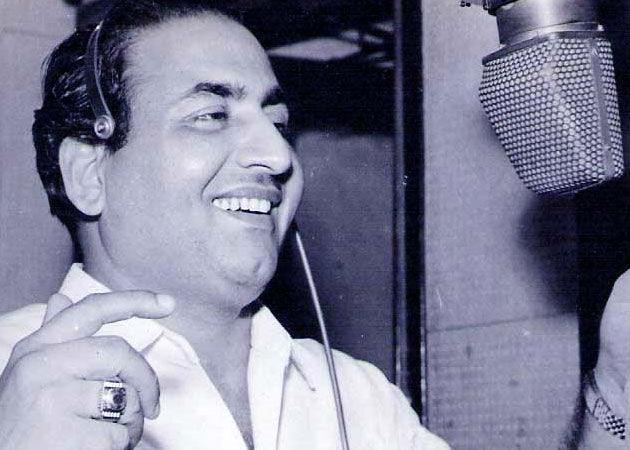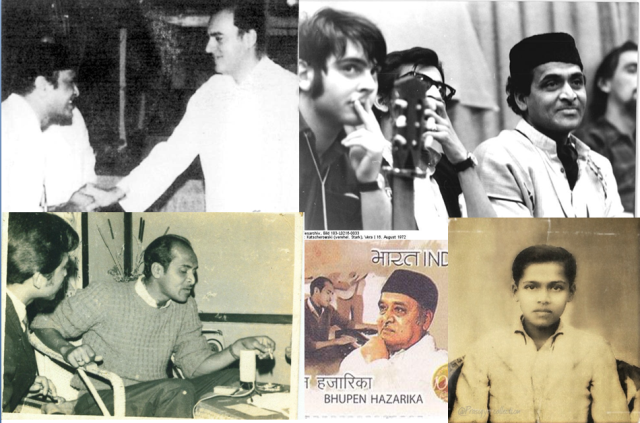 |
| 24.12.1924 – 31.07.1980 |
I have always maintained that I do not have a ‘favourite’ singer – male or female. I love songs, and which song I want to listen to, or which singer I like, depends on the moment and the mood I am in. In my post on Kishore Kumar, I responded to a comment about ‘favourite singer’ by saying “…when I hear Beqarar karke humein, Hemant Kumar is my favourite singer; when I hear Jinhe naaz Hind par, I love Mohammed Rafi; when I listen to Chalo ek baar phir se, I’m sure Mahendra Kapoor is my favourite singer. Yet there are so many many songs of Kishore’s that I listen to, over and over and over again.” That is equally true for female singers. But if I were forced to name a favourite singer, it would be, without any hesitation, Mohammed Rafi.
In the film based on the life of the legendary 19th-century poet, Mirza Asadulla Baig Khan, better known as Ghalib, this was the only Mohammed Rafi song other than a duet with Banda Hassan (Sakhi sarkar hain tere), and it was not picturised on ‘Ghalib’ (Bharat Bhushan). Ghalib’s voice in the film was Talat Mahmood while Suraiya sang for Chaudvin (Suraiya herself), Ghalib’s ill-fated lover. Directed by Sohrab Modi, the story was written by Sadat Hasan Manto, while Rajinder Singh Bedi worked out the screenplay. More than the fictionalised biography of Ghalib (there is no evidence to suppose that Moti Begum, a.k.a Chaudvin, the courtesan, ever existed), it was the use of Ghalib’s nazms and ghazals that were set to music by Ghulam Mohammed that raised the movie to one that was not merely a biopic. Ghulam Mohammed’s versions of Nuktacheen hain gham-e-dil, Dil-e-nadaan tujhe hua kya hain, Aah ko chahiye ek umr asar hone tak, etc., are still considered classics.
Bhajans are not usually my cup of tea, but there is something very attractive about Mohammed Rafi singing bhajans – the devotion is unmistakeable, the faith is unwavering, and it is hard, as a listener, to not feel it. (I feel the same way when I hear Yesudas sing Guruvayoor ambala nadayil for that matter. As my grandmother said when she learnt that the Guruvayoor temple authorities had forbidden him entry, “All Yesudas has to do is to sing it wherever he is, and Guruvayoorapan will present himself in front of him.”) That is precisely how I feel when I hear Mohammed Rafi sing a devotional song. Devout Muslim that he was, he seemed to transfer that faith to whichever God he was singing to – bearing out the tenet that there is just one God. Basant Bahar, adapted from Ta-Ra-Su’s (TR Subba Rao) Kannada novel Hamsa Geethe, had a plethora of melodious songs, including Manna Dey’s Sur na saje and Ketaki gulab ki, and the Lata-Manna Dey duet, Nain mile chain kahan.Rafi’s two solos, Badi der bhayee and Duniya na bhaaye mohe are no less soul-stirring. He instils both with the right blend of fervour and pathos.
Changez Khan (1957)
Music: Hansraj Behl
Lyrics: Qamar Jalalabadi
Changez Khan (real name: Temujin; Genghis Khan to the West) is a film better left unviewed unless you like getting your kicks out of purportedly historical films that have precious little to do with actual history. However, call it a cinematic license, what if Changez Khan had fallen in love with a Tatari damsel and was willing to put the land to the sword so he could claim her for his own? Wouldn’t that help explain his bloodthirsty conquests? (See… we have an explanation for everything!Of course, that wouldn’t explain the number of women he is supposed to have impregnated along his campaign trail. But then, who said we had to be factual?)
I do not remember much of the other songs in the film (I do remember a very young Helen dancing, though), but this one stands out for the music and the way Mohammed Rafi sings it. (It helps to see a very young and dashing Premnath onscreen too.) It starts off on the lower octave, and then soars to heights that seem incredible for a male vocalist, and then drops an octave and a half, with flawless control.
Dil Deke Dekho (1959)
Music: Usha Khanna
Lyrics: Majrooh Sultanpuri
If this is a post about Mohammed Rafi, can I leave Shammi Kapoor out of it? Rafi has indeed sung for many heroes before and after Shammi Kapoor, but the relationship between Shammi and Rafi transcended the usual affinity between actor and singer. Shammi, definitely, thought of Rafi as his voice, his soul. And he claimed that Rafi always put in ‘a little extra’ for him. It is true that the best songs of Shammi Kapoor have been sung by Mohammed Rafi. And when I did a post on Shammi Kapoor’s songs sung by Mohammed Rafi, it was hard to decide what to leave out. In fact, Hum aur tum aur ye sama has seen the light on several of my lists. But it is one of my all-time favourites, and to me at least, exemplifies all that is best about the actor-singer collaboration.
A handsome Shammi, a doe-eyed Asha Parekh, the swirling mists, Mohammed Rafi’s voice sounding like liquid gold, and intoxicating as hell… this was romance, distilled to its purest essence. This song was incredibly sensuous, but there was a tinge of innocence that offsets it. Usha Khanna’s music (her debut), barely there until it swells into a triumphant crescendo at the end, just complemented the picturisation.
6. Lagta nahin hai dil mera ujde dayaar mein
Lal Qila (1960)
Music: SN Tripathi
Lyrics: Bahadur Shah Zafar
The last Mughal Emperor of India is supposed to have written these lines while living his last days, ailing, in exile in Rangoon. There is a dispute whether the Bahadur Shah Zafar ever wrote this ghazal (or even Na kisi ki aankh ka noor hoon) but the film, and popular imagination credits the exiled and dying emperor with the writing this as his own epitaph. He was after all known to be an Urdu poet of no mean talent, and reportedly, wrote his verses on the walls of his prison with the burnt end of a stick when he was denied writing materials by the British, who were wary of his attracting an army to him through his poetry.
Rafi’s voice, reciting this ghazal, with barely any music to accompany him, carried every ounce of the pathos felt by the unfortunate emperor – a man imprisoned far away, lamenting his misfortune, not at losing the crown, but at the knowledge that he would not, after his demise, be buried in his homeland.
7. Jaane kya doondhte rehte hain
Considered one of Rafi’s best numbers, this extremely complicated song is also widely regarded as the best of Khayyam’s compositions. A very young Dharmendra (this was only his second film) sings his frustrations out on screen – Rafi’s voice expresses that emotion off screen. This is not a man who is merely expressing his heartbreak over a lost love; it is a person who has deliberately set out to obliterate any memories of a childhood love. In a test between friendship and love, one has to be sacrificed for the other. He chooses to sacrifice his love. Kaifi Azmi’s lyrics perfectly describe the emotions behind that decision.This is what set our legendary singers apart from their imitators – the ability to emote, in song, that which the actors expressed on screen. Rafi’s greatest virtue, apart from his unmistakeable vocal talent, was his ability to modulate his fabulous voice to suit the actor he was singing for. He sounded different while singing for Johnny Walker, for instance, or for Shammi Kapoor. His songs for Dev Anand sounded different from his singing voice for Rajendra Kumar. 8. Nain lad jai hein
Ganga Jumna (1961)
Music: Naushad
Lyrics: Shakeel Badayuni
As I said before, Naushad could rightly claim to be the person who ‘introduced’ Mohammed Rafi to the Bombay film industry. After all, it was his composition in Pehle Aap that was Rafi’s first released song after he left Lahore. Why did I choose this song over Naushad’s raga-based compositions for Mohammed Rafi? Simply because I wanted something different. The first composition that comes to mind when I think if Naushad-Rafi is O duniya ke rakhwale, and I already had abhajan. Besides, this song is great fun. A brothers-on-the-opposite-side-of-the-law story set against a rural background, the film veered away from Hindi to use a dialect. Bhojpuri. (It is closer to Avadhi; see AK’s comment below.) While South Indian Vyjayanthimala impressed with her faultless enunciation, lyricist Shakeel Badayuni also used Bhojpuri the dialect for the lyrics, instead of Hindi, to insert a sense of verisimilitude into the proceedings. Mohammed Rafi, as usual, sang this song with the same elan with which he sang songs written in Hindi and Urdu. This was one of Naushad’s best scores in later years.
Tere Ghar ke Saamne (1963)
Music: SD Burman
Lyrics: Majrooh Sultanpuri
This song, as much as any other that Mohammed Rafi sang for Dev Anand, typified the person Dev Anand was – full of life and the joy of living. Rafi’s voice, swelling and ebbing through the serpentine roads on a misty night, is filled with the ecstasy of love, and brimming with the eagerness to find one’s beloved behind the closed doors and shuttered windows. And when he finally sees her, smiling gloriously at him, it is as if the moon has just stepped out from behind the clouds, dispelling the darkness around. Just hear the complete and joyous surrender in both Dev’s face and Rafi’s voice as the song comes to a close.
10. Pipra ke patwa
Godaan (1963)
Music: Pt. Ravi Shankar
Lyrics: Anjaan
Based on Munshi Premchand’s famous novel of the same name, Godaan was the story of a farmer and his family, set against a background of class and caste discrimination and injustice. Mehmood plays the younger brother, with greyish undertones, very dissimilar to his usual comic side roles. Like Ganga Jumna before this, Godaan also used the Bhojpuri a regional dialect to great effect. Anjaan’s lyrics evoked the rustic simplicity of a villager, and Pandit Ravi Shankar used folk music very effectively in this lovely composition. The rollicking folk tune is the kind that puts a smile on your lips and a lilt in your step as you go about your day. And as always, Mohammed Rafi sings it with a vim and a verve. You can sense the joy that Mehmood’s character feels as he goes back home to visit his beloved.
Parasmani (1963)
Music: Laxmikant-Pyarelal
Lyrics: Indeevar
The composers, once music arrangers for SD Burman and later assistants to Kalyanji-Anandji got their big break with Babubhai Mistry’s fantasy Parasmani. (Their first film Hum Tum aur Woh as independent composers was not released.) Parasmani was one of those films that had better songs than it deserved. Each one of the songs that the young music directors meticulously composed was a gem. They had the backing of some of the greatest vocal talents in the industry as well – Lata Mangeshkar (Hansta hua noorani chehra with Kamal Barot and Ooi ma ooi ma), Mukesh (Chori chori jo tumse mile), and Mohammed Rafi (Roshan tumhi se duniya and Woh jab yaad aaye). It was the beginning of a long association with Mohammed Rafi and Lata Mangeshkar. Roshan tumhi se duniya had Rafi exercise his considerable vocal skills as he plays effortlessly with the notes. He makes the song sound exceedingly simple.
The songs of Parasmani, however, were not the legendary singer’s first songs with the composer duo. Mohammed Rafi’s first recorded song for LP was Tere pyar ne mujhe gham diya from Chhaila Babu. It was recorded in 1961. However, the film only released in 1967.
Chitralekha (1964)
Music: Roshan
Kidar Sharma had already adapted the novel of the same name by Bhagwati Charan Verma, into a film starring Mehtab, Nandrekar, and AS Gyani. He decided to make it again 23 years later. Chitralekha, brought to a realisation of Princess Yashodhara’s love for Bijgupt, commander-in-chief of the Mauryan army, decides to forsake her love for the sake of king and kingdom. However, Bijgupt is bereft, and feeling the pangs of lost love. He seeks refuge in an outpouring of grief that questions not just how love seems to end in heartbreak, but the futility of life itself. Roshan’s music and Sahir’s lyrics combined to give us one of Hindi film music’s clasic melodies. Mohammed Rafi’s mellifluous voice melds mood and music together to bring to life one of Hindi cinema’s finest odes on love and loss.
Ishaara (1964)
Music: Kalyanji-Anandji
Lyrics: Majrooh Sultanpuri
It was interesting to see how Mohammed Rafi modulated his voice in this song. The song has all of Rafi’s adaas even though it is one of the quintessential romantic numbers that he had sung a hundred times before. I love the way his voice rolls over the syllables, almost as if he is drunk – on love, not liquor. Sublime.
14. Choo lene do nazuk hothon ko
Kaajal (1965)
Music: Ravi
Lyrics: Sahir Ludhianvi
Based on Tess of the D’Ubervilles, and credited for the same, the film did not have much to recommend it, even with its stellar cast of Nutan, Dharmendra and Rehman. (Even though we got to see some fantastic acting from all three leads as well.) However, it did have some wonderful songs, courtesy a certain Madan Mohan Kohli, ably complemented by his long-time lyricist Raja Mehdi Ali Khan. As was the case with most films that Madan Mohan composed for, Dulhan Ek Raat Ki found few takers at the box-office. Perhaps the fact that it was a Black & White film in an era where colour had begun to be the default proved to be its nemesis. Or perhaps people just didn’t want to see such a tragic film. Its music, however, continues to delight us. Mohammed Rafi’s voice caresses the notes, reminding us of the whiff of long-gone romance that continues to faintly linger on in our memories.
Baharein Phir Bhi Na Aayegi (1966)
Music: OP Nayyar
Lyrics: Anjaan
Teesri Manzil (1966)
Music: RD Burman
Lyrics: Majrooh Sultanpuri
RD Burman very nearly did not compose for Teesri Manzil. He had been signed on, in place of his father who was unwell at the time, when Dev Anand toplined the cast. Unfortunately for RD, Dev Anand was then busy with his home production, Guide, and decided that he couldn’t take on more work. Shammi Kapoor stepped in. It was well-known by then that Shammi’s composers of choice were Shankar-Jaikishen or OP Nayyar. But Jaikishen persuaded Shammi Kapoor to give RD Burman a chance. In a later interview, RD would mention how nervous he was at the audition. When he nervously sang the first two lines of a Nepali folk song, “Shammi completed the song for me and said ‘Aage chalo. Ye gaana main Jaikishen ko denewala hoon.’ ” That completely destroyed the young composer’s equilibrium. But soon he won over the charismatic star, and RD was on board. With Shammi in the film, there could also be no dispute over who the male playback would be – and so Mohammed Rafi got to sing every song, solo and duet, his smooth vocal calisthenics making every song seem simple – from the rambunctious Aaja aaja main hoon pyar tera to the lively O haseena zulfonwali to the softly romantic Tumne mujhe dekha.
These are but a few of my favourites from among Mohammed Rafi’s vast repertoire of solo songs. As you may imagine, it is a hard task to keep to a limited number of songs. And as always in this category, I need to keep the duets for another post since it is well nigh impossible to do justice to both solos and duets in just a single post. Hence, part II will have a selection of some of my favourite Rafi duets.
Written By: Anuradha Warrier, is a writer, editor, film and music buff. She writes for pleasure, edits for a living, and indulges in watching films, listening to music, and writing about both on her blog Conversations Over Chai as and when time permits.
DISCLAIMER: The views expressed are solely of the author and Bollywoodirect.com do not necessarily subscribe to it. Bollywoodirect.com shall not be responsible for any damage caused to any person/organisation directly or indirectly.




